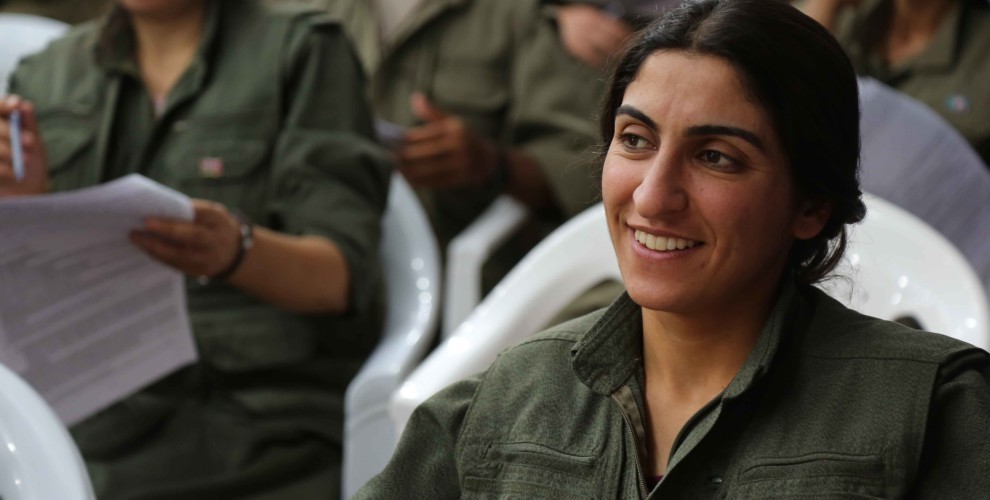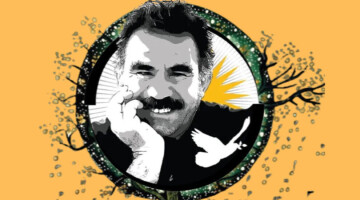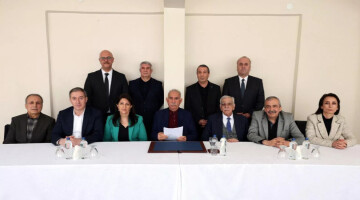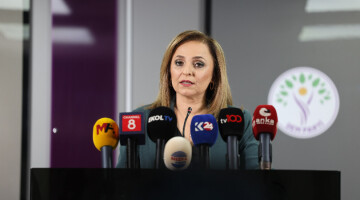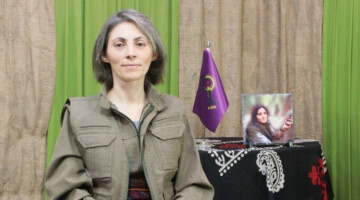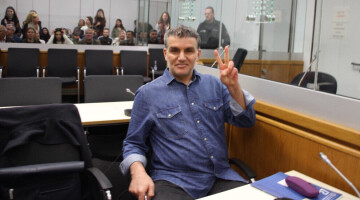PJAK (Kurdistan Free Life Party) Co-chair Zilan Vejin answered ANF’s questions on Iran’s alliances with regional powers against Kurds and the issues it has been having with international powers.
The US and international forces have embargos in place against Iran. Despite the embargo, Iran continues with its regional policies. Could an intervention against Iran be in the cards?
There are fast paced instantaneous changes and transformations in the Middle East. There is a chance for a more violent war to break out. All of Iran’s efforts in recent years have been towards increasing their hegemony in the region. It could be said that they have achieved this goal to a point. They have positioned their forces through Hashd al-Shaabi forces in Iraq and Syria, Hezbollah in Lebanon and Houthis in Yemen. As the US and Arab countries wish to restrict and weaken Iran, the country is taking positions in a wide area. Thus, many things need to be taken into consideration for an attack on Iran.
The fear the US has is that the conflict in the region will spiral out of their control and Iran will increase its influence in the meantime. That is why they threaten Iran every day through different means, but the only possibility is the deepening of the embargo. The US has voiced its anti-Iran stance and issued threats for years, but neither the US nor international powers have intervened with Iran to date. The war with Iran has been indirect. But developments in the region show that actors need to be ready for all possibilities.
Iran has anti-Kurdish policies over Rojava together with Turkey and Russia. What will the cost of this be for Iran?
With the launch of the Astana and Geneva talks, the three states developed a relationship over the agenda of Syria and Rojava. Russia doesn’t want to be directly anti-Kurdish like Iran and Turkey, but they are seen to be going down this path as per their interests. The three states agree on preventing Kurds from achieving a role in Syria. Iran wants to have military bases in Syria, and their policy for Kurds is to ignore them. So they think Kurds shouldn’t come forth as a nation. They consider Kurds the greatest threat to their future in Syria.
It should be seen and understood that the gains Kurds make in Rojava and Syria are victories for the Syrian peoples as well. Recognition of the Kurds’ political will and achieving a political status will have a positive effect on the future of all Kurds. Iran’s opposition to this on the other hand will cause harm politically, historically and socially.
If it wasn’t for the Kurds’ resistance and fight against ISIS, the situation in Syria would have been worse and more complicated. This is true for the coming period for Iran as well. Any negative approach towards the Kurds and their struggle for equality, freedom and peace will deepen the crisis and war in the region. The way to a solution lies with accepting the Kurdish reality and achieving peace among peoples.
Iran has conflicts with Russia and Turkey too. But when it comes to Kurds, they form an alliance. As a result of this alliance, Turkey entered Idlib with Iran’s consent. And now they want to invade Efrîn. Where could this partnership extend to?
History has shown that forces that desire power in the region can put aside their historical conflicts and come together in anti-Kurdish policies. For instance, the 7th article in the Qasr-i Shirin treaty was based on anti-Kurdish sentiment. Later on the implementation of the treaty was delayed and the articles rendered moot, but the 7th article remained in place. These policies are in motion now too. Iran and Turkey put aside their strategic conflicts and hold military, diplomatic and economic meetings against Kurds. According to the Misak-i Milli (National Pact), Kirkuk is Ottoman territory. How can Turkey let Hashd al-Shaabi enter Kirkuk under Iran’s supervision now? Again, why does Turkey stay silent when Iran strengthens the Shia line in the region? The answer to these questions is, once again, Kurds.
Attacks on Idlib and Efrîn are also related to the Rojava Revolution and the gains of the Kurds. They consider the democratic nation model a great threat. The democratic nation means the fall of Turkish, Arab and Persian states. That is why their agreement emerges over weakening the Kurdish Freedom Struggle. But I believe they will not prevail, because the forces in question are as afraid of each other as they are of the free will of Kurds and the peoples. The historical and political conflicts among them will push them apart shortly. The Kurdistan Freedom Struggle currently affects the whole region as an important actor in the balance in the Middle East. Turkey and Iran are holding meetings for various aspects to weaken this influence. But both forces want to take advantage of the conflict between Russia and the US and design the region. If Russia and the US can agree on certain issues, the Turkey-Iran partnership will falter. The Kurds’ relationship with the US and Russia also creates a conflict. Everybody knows that a solution in Syria without Kurds won’t last, and it will deepen the crises in the region.
Recently Iran launched interventions on Southern Kurdistan over Kirkuk. Where will these interventions lead?
Kirkuk is a strategic province. It is also the center of the Iraqi economy. Oil reserves, seen as important by all regional and international powers, are in this area. The referendum in Bashurê (Southern) Kurdistan was used as a provocation against Kurds and Kirkuk, Khanaqin, Shengal and Makhmur were invaded. And that means the invasion of Kurdistan. Kirkuk’s oil was confiscated, the Bashur administration had not anticipated this plan. They didn’t heed warnings on this either. So Iran is increasing interventions on Bashurê Kurdistan and Iraq. The situation that emerged with Barzani and the PUK-KDP was a betrayal to the gains Kurds made.
You are a movement that fights Iran. You fight against Iran’s Kurdish policies. Can you expand upon the Iranian regime’s dangerous policies? What should Iran do to overcome the difficulties they are experiencing?
Iran is going through a delicate period. They have difficulties in the international arena, they are facing threats. An important point is that Iran is building a relationship with their enemy’s partner. The relationship between the US and Turkey is well known, as is the relationship between Turkey and Saudi Arabia. Turkey and Erdoğan want to develop a Sunni Caliphate project, and that is against the Shia line in the region. As required by their interests, Turkey may eliminate Iran if Iran is in a difficult situation. That is the danger Iran is facing.
As the people’s opposition rises in the country, Iran adopts a harsher stance against nations, peoples and faiths. It increases the pressure. Recently there was a large scale earthquake in Rojhilat. Iran didn’t even fulfill humanitarian duties there. Iran’s stance towards Kurds and the Yarsan Kurds in particular is discriminatory. These create a great reaction against the system. The current regime doesn’t recognize any rights for the society, they work on oppression and violence.
Even though Iran seems to have a strong foothold in the region, these issues they create within society will bring about a domestic collapse. The dynamic force in society is being eliminated. All the peoples in Iran, the women and the youth live in poverty and unemployment while also facing political and cultural oppression.
And that deepens the domestic crisis. To speak of a strong Iran, politics and administration need to be democratized, the economy, law, defense, education systems need to be democratized. When Iran develops democratic politics in the country and recognizes the rights of all peoples, for sure they will better eliminate threats against them. But if they insist on their previous politics, there will come a popular revolution Iran can’t stop. They can’t continue with the oppression and hegemony, or they could face foreign intervention.
Iran has entered the world’s agenda through their forces in Lebanon, Iraq and Syria. In Lebanon and Syria it’s the Hezbollah, and in Iraq it’s Hashd al-Shaabi. These are also forces that fight in the name of Iran in the region. What does Iran seek to achieve with these forces?
Iran’s efforts are geared towards preventing the spread of the war within its own borders. For that, they wage a dirty war in the region. Iran’s operations in Iraq was in essence against the US and Israel. They want to complete the Shia line through Hashd al-Shaabi and the Hezbollah and to push forth the Shia bloc against the Sunni bloc. Iran makes these forces fight against the US, Saudi Arabia and Israel in some countries in the region. In others, it uses them against Kurds directly or indirectly. Iran is particularly afraid of the Kurds’ strength in Syria. Not just Iran, all forces that are engaged in war in the region openly or covertly oppose the Kurds’ status. They want to implement their own projects against the democratic nation project in this way.
The Iran, Saudi Arabia and Qatar crisis continues. What is the reason behind this crisis, and how can it be overcome?
The balance between Arab forces and Iran-Turkey was formed in the bipolar world order in the 20th century. Now this balance is changing. Saudi Arabia has always wanted to have influence in the region as a leading Arab force and to control all Arab states. Egypt, Iraq and Syria who want to become significant powers occasionally have been weakened due to civil war or wars with other states. And now Qatar is being disciplined for the relationship with Iran. And Iran wants to prevent its partner losing strength. Thus the war being waged is a power struggle between the Iran-led Shia front and Saudi Arabia-led Sunni front. The crisis looks like it will continue.
There is talk of cooperation between Iran and Turkey against you as a movement. In Asos and other locations, there have been attacks against you. What is the purpose of this cooperation, and how will your stance be in the face of this?
In the past there have been various meetings between the two states. Iranian Chief of Staff Mihemed Baqiri went to Turkey and held visits. There were other meetings in Iran. The main agenda in these meetings was joint attacks and operations against our movement. Other issues were what positions they would take in Syria and Rojava. They carried out 3 aerial attacks during that time. The attacks were a result of the Iran-Turkey cooperation. Before that, in 2011, Iran’s attack on Qandil was also done with a Turkish-Iranian cooperation.
Even though the attacks were on the Bashûrê Kurdistan Federal Region territory under the Iraqi central government, neither Bashur nor Iraq administrations displayed any kind of a stance. Turkish jet fighters and Iranian scout planes fly over the area. The continuation of joint attacks will draw Iran further into the quicksand of the region and the door Kurds opened for peace may be shut completely. The deepening crisis and war may put Iran in a more difficult position.
As the PJAK, we will leave no attack against our people or the guerrilla territory unanswered. We reserve our right to defense and retaliation. But the main focus for us is democratic politics and the struggle through negotiations. As long as the circumstances allow it, our insistence will be towards a solution.

